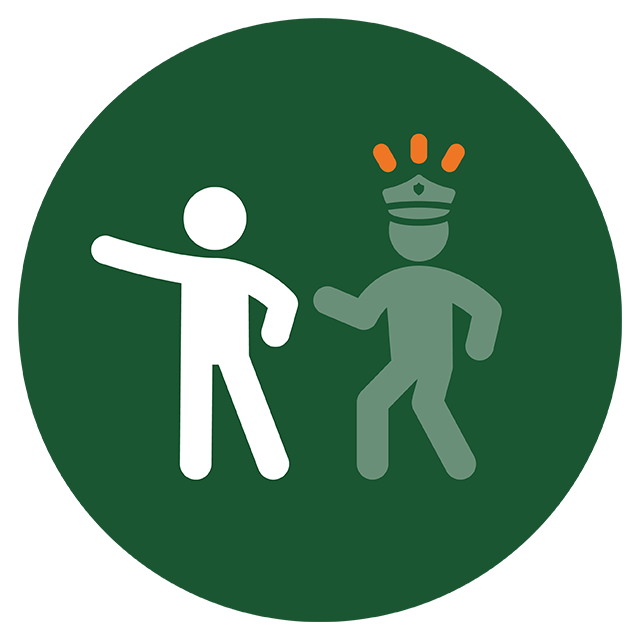Prevention
Bystander Intervention: In today's world, the responsibility to ensure collective safety falls on each and every one of us. Explore these valuable insights and tips offered to empower you as a responsible bystander.
- When you're out with friends, it's essential to maintain a sense of unity and security.
Stay connected throughout the event and even after leaving.
Vigilance is your ally; trust your instincts, for if something doesn't feel right, it likely isn't. 
Remember The Three "D's" Of Being A Good Bystander!: By familiarizing yourself with the "Direct, Delegate, and Distract" approaches, you can become a valuable asset in creating a safer and more supportive campus environment for all.
-
1. Direct Intervention

Taking Immediate Action
Direct intervention involves stepping into a situation by addressing the people involved head-on, often requiring assertiveness and quick thinking to to achieve a positive outcome.
You can take direct action with confidence by doing actions, such as:
» Asking if someone is okay: Approach individuals who appear distressed or in need of help and offer assistance.
» Escorting an intoxicated friend: If a friend has had too much to drink, ensure their safety by guiding them out of a party or social event.
» Challenging offensive behavior: Politely but firmly address offensive jokes or comments made by someone to promote a respectful environment.
» Intervening in conflicts: Step in to mediate or defuse arguments or confrontations between others to prevent escalation.
» Preventing bullying: Speak up when you witness bullying or harassment and offer support to the victim.
» Standing against discrimination: Actively oppose discriminatory behavior or actions when you encounter them. -
2. Delegate Intervention

Seeking Support
Delegate intervention is a smart approach when you feel unsafe, uncomfortable, or ill-equipped to intervene personally. You can seek assistance from someone better suited for the situation
You can effectively enlist assistance through various means, such as:
» Involving campus security: If you witness aggressive or dangerous behavior, call campus security to remove someone who is being aggressive and handle the situation professionally.
» Seeking assistance from Resident Assistants (RAs): If you're concerned about a roommate's well-being or relationship, inform your Resident Advisor, who can provide appropriate guidance and support.
» Engaging a closer friend: When you're not in the best position to assist someone, enlist a friend who has a closer relationship with them to check in on their welfare.
» Utilizing campus resources: Direct individuals in need to campus counseling services, health centers, or other relevant support structures.
Counseling Services
Student Health Services
» Reporting safety concerns: If you notice unsafe conditions or potential hazards on campus, report them to campus authorities or facilities management.
Title IX
Department of Campus Safety & Security (FAMU PD) -
3. Distract Intervention

Diversion Strategies
Distracting involves using clever tactics to create interventions, redirecting attention away from a potentially problematic situation, and ultimately helping to de-escalate it.
You can utilize creative methods to intervene effectively, including:
» Engaging in friendly conversation: Strike up a conversation with someone who seems uncomfortable, diverting their focus from a distressing person or situation.
» Creating a diversion: Spill a harmless substance, like water, near individuals involved in an argument to distract and defuse tension.
» Pretending to know someone: If you see someone who appears to be feeling uncomfortable around another person or situation, approach them and pretend to know them, giving them an opportunity to gracefully exit the situation.
» Offering assistance: Approach someone who appears uncomfortable and ask if they can help you with a task, like finding your keys or a lost item.
» Using humor: Employ humor to lighten the mood and ease tension in awkward or uncomfortable situations.
Upcoming Events
First-Year Students
A required seminar covering Title IX, bystander intervention, and campus resources will be held early in the Fall 2021 semester. If you are a student survivor concerned about attending this training, please contact the victim advocate to discuss options.
October is Domestic Violence Awareness Month
More details will be coming soon!




